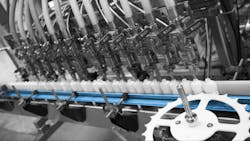Three Ways Food Manufacturers Leverage Technology to Stay Nimble
Change is a constant in every industry. But few markets change as quickly as the food industry. As people’s tastes evolve, food producers must evolve too—or risk getting left out of the shopping cart.
Food producers often seek to stay at the forefront of the market by making strategic acquisitions. That was the case in 2009 when Dominion Liquid Technologies (DLT) purchased Flavor Syrups International, a specialist manufacturer of coffee syrup. The new company that resulted was better positioned to compete in a crowded market due to its size and product offerings, but faced significant obstacles in getting started. For one thing, Flavor Syrups International’s aging software platform couldn’t adequately support a growing business.
“I knew right away that the software we were using to manage the business was suboptimal,” recalls Charlie Cain, president and CEO of DLT. “It was very clear that a new ERP solution would help us to build a more efficient business, reduce waste, and grow rapidly while delivering quality products through every production run.”
While DLT had gained some competitive advantage, inefficiency was a barrier to market leadership. At the time of the acquisition, nearly every business process at DLT—from inventory audits to line checks—happened on paper, which severely hampered productivity. But as DLT planned to transition its processes to a technology platform, the company’s leadership wanted to avoid becoming so regimented that they couldn’t react quickly to changes in the market. Any solution DLT implemented would need to enable greater agility across the business.
That’s why DLT looked to the cloud. Knowing that modern cloud-based ERP software solutions are designed to break down organizational silos and put real-time business data at employees’ fingertips, Cain and his team explored their options. By the end of the evaluation process, and with the help of their technology partner Revolution Group, DLT found a solution: The Plex Manufacturing Cloud.
Deployment took just six months. And since the go-live date, DLT has been leveraging technology to solve its business needs in these three ways:
#1: Data Flows Freely to Mobile Devices
The modern manufacturing process revolves around data. But shop floor workers don’t have time to keep running back to computer terminals and punching in updates on inventory, defects, or labor issues.
The Plex Manufacturing Cloud gives DLT improved shop floor control and the freedom to distribute information to mobile devices right on the shop floor. Employees now carry tablets and smart phones around the assembly line so that they can record data without interrupting their workflow. They also receive text or email alerts when production is interrupted or inventory runs low.
“One of the benefits of working with Plex is that if something is out of specification, whether I’m here or out of the plant, I get notified via text or e-mail,” says Daren Brown, quality manager at DLT. “This enables us to monitor the process from front to back.”
#2: Less Focus on Software Means More Focus on Customers
Test ingredients and recipes. Manage production schedules and third parties. Ensure that products are shipped correctly. Safeguard finely-tuned margins. And adhere to stringent quality targets. As a busy contract manufacturer, DLT must juggle customers’ hugely diverse needs. All of these challenges are more difficult to meet for companies that must devote significant resources to implementing, maintaining, and upgrading traditional ERP systems.
By contrast, running their operations in the cloud means DLT’s entire staff can focus on meeting customer needs and enhancing the excellence of their products, rather than managing on-premise ERP and the hardware that supports it. And they can scale their cloud environment as they grow, without any of the heavy lifting required to build and manage their own datacenter.
#3: Every Business Decision Is Backed by Data
Decision-makers want a complete view of the business to make critical, strategic decisions. Connecting an organization comprehensively in the cloud makes that visibility, and the ability to act on it, possible.
“Historically, different teams within the manufacturing process worked in silos, making information sharing slow, clumsy, and error-prone,” recalls Cain. “It was extremely difficult for us to get accurate and reliable data on things such as inventory levels and expiration dates. What we really needed was a system that could give us real-time information so that we could make better-informed decisions. We knew this was vital to our bottom-line growth.”
With the Plex Manufacturing Cloud, not only can line workers review and update production data at their workspace in real time, but managers and executives can also get instantaneous business information in the palms of their hands. Because the system is available through any browser and through mobile applications, decision-makers can use any web-enabled device to check in on material availability, customer service levels, production schedules, or cash flow.
These capabilities help DLT compete in a crowded market. By staying one step ahead of their competition in speed, efficiency and quality, the team can focus on innovating and delivering popular products that can win a greater share of the shopping cart.
